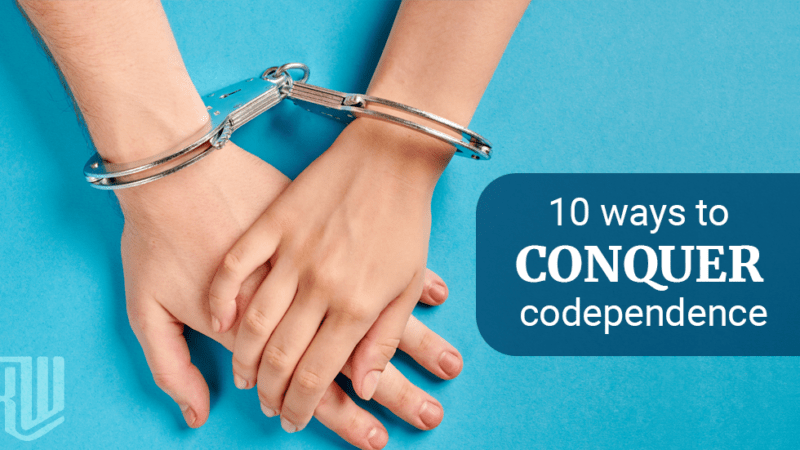Welcome back! In today’s article, I will share what I believe are the 10 steps both personality types should take to heal from codependence. If you are unsure which type you are, go back and watch my video on the two types.
One is the classic disempowered: this is what we typically think of when we think of codependence. They try to take care of everyone. Few people recognize the polar opposite type: the falsely empowered codependent. This is a typically successful person, but the grandiose and anti-dependent personality is hiding codependence. Neither side is in reality: each is stuck in a child-like state. Recovery is recognizing this is what we’re doing and getting into reality.
Alice Miller has a great quote in The Drama of the Gifted Child about the need for us to get into reality,
“Both the disempowered and the falsely empowered person completely deny their childhood reality by living as though the availability of the parents can still be salvaged. The falsely empowered person does this through the illusion of achievement and the disempowered through their constant fear of losing love. Neither can accept the truth that this loss or absence of love has already happened in the past and that no effort whatsoever can change this fact” (I’ve switched out the terms she uses for “disempowered” and “falsely empowered” for clarity).
This highlights the stumbling block for all of us in codependence. However, the ship has sailed, and we must do the work now as adults.
Let’s get into the 10 steps for getting back into reality. For the disempowered:
- Self-esteem. They really struggle with the sense of self because they think doing for others elevates their sense of self when it really does the opposite. If you want to get into more details on this, I suggest you watch my video How to Build Self Confidence – it is great for laying out the steps to achieve self-love.
- Stop shaming themselves. They spend a lot of time in guilt and shame, especially when doing things for themselves. They must heal from this – I suggest another video of mine called How to Heal Shame.
- Start asking for and meeting their own needs and wants. They feel guilt and shame when asking for anything.
- Start taking care of themselves first. They were trained the only way to survive and get mom and dad’s attention was to give themselves away. They need to ask themselves who they are and what they truly like. Stop focusing outside. Start focusing internally.
- Learn to share what they really think and feel. Inside they’re boiling with anger, but they don’t voice it. Instead, they may be passive-aggressive or expect others to mind-read. It’s not their fault – they learned to suppress their anger in childhood.
- Take responsibility for their thoughts, feelings, and actions. We always have a choice, but codependence puts the responsibility on others, saying, “you made me…” This phrase demonstrates a person is not in reality and is stuck in a child-like state.
Get into reality.
- They don’t realize their “niceness” is not truly nice – it’s actually manipulation. The proof is in the hidden anger and resentment. Because they give themselves away, they have interpersonal issues and keep track of everything. They’re doing it as a form of barter, and they’re hoping for the same in return. In dealing with their rage and resentment, they need to face the facts. It is time for them to accept the fact that taking care of others is a form of self-absorption. They’re abandoning themselves just like they were abandoned in childhood.
- Practice the three Gets of AL-ANON. Get off their back, get out of their way, get on with their life. On their back, means they notice everything in other people’s life. It’s none of their business, and others can live how they want, so they must get off their back and out of the way. They must get on with their own life by meeting their wants and needs and getting into reality.
- Say no. They tend to say yes to everything – they couldn’t say no in childhood. They need to rebuild esteem, so they feel worthy enough to say no.
- Set boundaries. The best place to learn is Pia Mellody’s Facing Codependence. Everyone should read this book to learn what healthy boundaries are.
For the falsely empowered:
- Self-esteem. They think they have self-esteem because they’ve achieved so much. So they use achievements and material things to cover up a lack of self-esteem.
- Ask for and get support. They are anti-dependent and do everything on their own. They must open up, be vulnerable, and realize it’s not a weakness.
- Take responsibility for their thoughts, feelings, and actions, just like above.
- Stop saying no to gain power over someone. They won’t argue for fear of losing power, and they won’t spend time with you, etc. They need to address how they use this as a power mechanism.
- Be more vulnerable and transparent. They don’t authentically share their thoughts and feelings to hide their unhealed pain.
- Address their avoidance mechanisms. They’ll use work, kids, addictions, and activities to avoid themselves and others.
Stop giving advice.
- This is another power mechanism they employ.
- Stop the controlling. They’ll demean their partner by saying they want too much – they will use judgment, blame, and criticism to attain more power.
- Get into reality, just like the disempowered. First, it’s challenging for them to admit they’ve been through childhood trauma. Next, they must realize their outside accomplishments are an attempt to fill an inner hole. Many athletes, actors, and politicians are looking for money to validate themselves and avoid the past’s pain. Finally, they must accept they have a problem. This will likely be the hardest step – it’s tough for this side to accept they have an issue.
- Seek professional help. The detachment from reality is much more severe because they have been convinced their achievements prove well adjusted.
There are the 10 steps for both sides of the codependent dynamic to conquer their codependence. I suggest you check out the links I’ve included for a deeper dive into the recovery process.
Or…
If you are ready to dive right now, you can learn how to conquer codependence in my new masterclass.
Enjoy The Journey!





